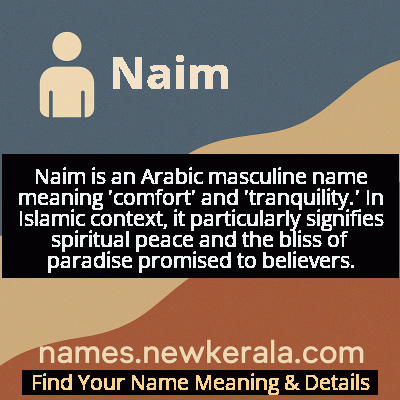Naim Name Meaning & Details
Origin, Popularity, Numerology Analysis & Name Meaning of Naim
Discover the origin, meaning, and cultural significance of the name NAIM. Delve into its historical roots and explore the lasting impact it has had on communities and traditions.
Name
Naim
Gender
Male
Origin
Muslim
Lucky Number
1
Meaning of the Name - Naim
Naim is an Arabic masculine name meaning 'comfort' and 'tranquility.' In Islamic context, it particularly signifies spiritual peace and the bliss of paradise promised to believers.
Naim - Complete Numerology Analysis
Your Numerology Number
Based on Pythagorean Numerology System
Ruling Planet
Sun
Positive Nature
Leaders, ambitious, highly driven, self-reliant, innovative.
Negative Traits
Overly aggressive, domineering, impatient, selfish.
Lucky Colours
Red, orange, gold.
Lucky Days
Sunday.
Lucky Stones
Ruby, garnet.
Harmony Numbers
2, 3, 9.
Best Suited Professions
Entrepreneurs, managers, engineers.
What People Like About You
Courage, determination, leadership.
Famous People Named Naim
Naim Süleymanoğlu
Weightlifter
Three-time Olympic gold medalist and seven-time world champion, known as 'Pocket Hercules'
Naim Frashëri
Poet and Writer
Albanian national poet and prominent figure of the Albanian National Awakening movement
Naim Attallah
Publisher and Businessman
Influential British publisher and former chairman of Quartet Books
Naim Talu
Economist and Politician
Served as Prime Minister of Turkey and held various key ministerial positions
Name Variations & International Equivalents
Click on blue names to explore their detailed meanings. Gray names with will be available soon.
Cultural & Historical Significance
Historically, the name has been borne by various scholars, poets, and leaders across the Muslim world, from Ottoman territories to Mughal India and beyond. Its usage spans diverse regions including the Middle East, North Africa, the Balkans, South Asia, and Southeast Asia, demonstrating its universal appeal across different Muslim cultures. The name's consistency in popularity over centuries reflects its timeless quality and the enduring importance of its meaning in Islamic spirituality. In many Muslim societies, naming a child Naim represents a prayer for the child to lead a peaceful life and ultimately attain the comfort of paradise.
Extended Personality Analysis
Individuals named Naim are typically characterized by their calm demeanor and ability to create harmonious environments. They possess a natural inclination toward peacemaking and often serve as stabilizing forces in their social and professional circles. Their tranquil nature is not passive but rather reflects a deep inner strength and emotional intelligence that allows them to navigate complex situations with wisdom and patience. Naims are often perceived as reliable, thoughtful, and emotionally balanced individuals who approach life with a measured perspective.
In interpersonal relationships, those named Naim tend to be excellent listeners and empathetic companions who provide comfort and support to others. They often excel in careers that require diplomacy, counseling, or caregiving, where their innate ability to understand and soothe others becomes particularly valuable. Their personality combines practical wisdom with emotional sensitivity, making them trusted advisors and loyal friends. While they may appear reserved initially, Naims typically form deep, meaningful connections and are known for their consistency and dependability in all aspects of life.
Modern Usage & Popularity
In contemporary naming practices, Naim maintains its traditional appeal while adapting to modern global contexts. The name continues to be popular across Muslim-majority countries and diaspora communities, with consistent usage in regions including the Middle East, Turkey, the Balkans, South Asia, and Southeast Asia. While not typically among the top trending names in most countries, it enjoys steady popularity due to its beautiful meaning and religious significance. In Western countries with significant Muslim populations, the name has gained visibility and acceptance, often appearing in its various spelling forms like 'Naeem' or 'Na'im.' The name's modern appeal lies in its combination of cultural authenticity, pleasant phonetics, and profound meaning that resonates with contemporary values of peace and emotional well-being. Recent decades have seen the name maintain its traditional base while also attracting parents seeking names with spiritual depth and cross-cultural accessibility.
Symbolic & Spiritual Meanings
Symbolically, Naim represents the profound human yearning for peace, comfort, and spiritual fulfillment. Beyond its literal meaning, the name embodies the Islamic ideal of attaining inner tranquility through faith and righteous living. It symbolizes the concept of being a source of comfort to others - a calming presence that soothes turmoil and brings harmony to challenging situations. Metaphorically, Naim represents the oasis in life's journey, offering refreshment and respite from worldly struggles. The name also carries the symbolism of divine reward and eternal peace, connecting the bearer to the Islamic promise of paradise. In a broader philosophical sense, it represents the ability to find contentment within oneself regardless of external circumstances, and the capacity to extend that peace to one's community and relationships.

